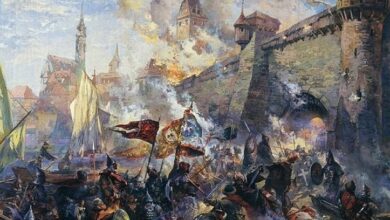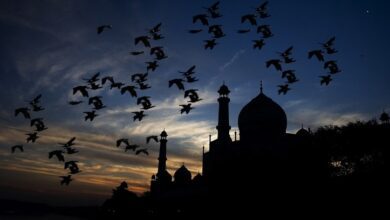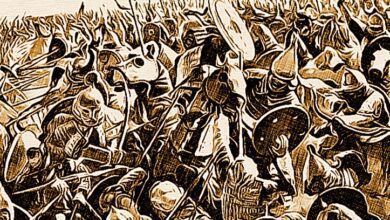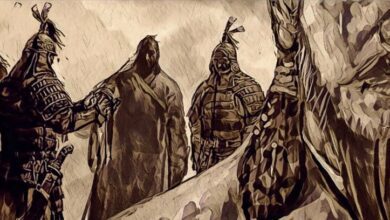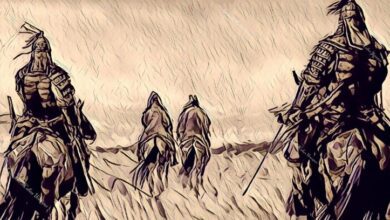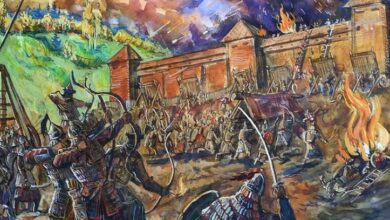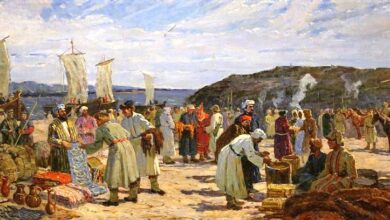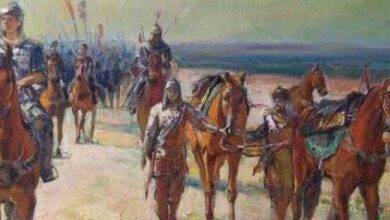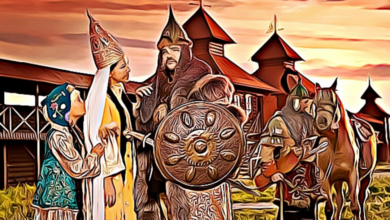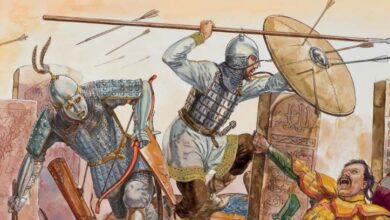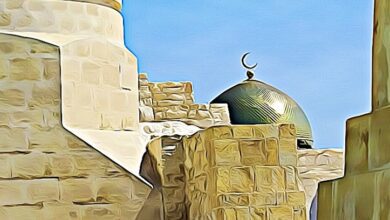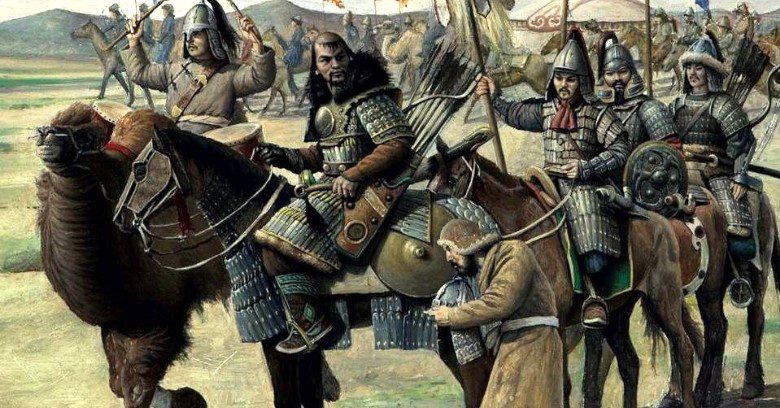
Ghazi Baraj Tarihi. Chapter 25
AtHearing the shouts of the Tatars, I got up with difficulty and left the yurt. At this time, 10,000 Bulyars who survived the massacre were taken out of the citadel into the field. Guyuk demanded to kill everyone, but with the help of Mankai and Subyatay I defended the civilians. After that, a thousand fighters in armor were separated from the spared and prepared to kill them. I accidentally noticed Gali among them, deliberately turning his face away from me. In his arms he held his grandson, who clung to him in fear. Not remembering myself, I shouted terribly to the khans, pointing to the seid: “He cannot be executed - after all, he is the supreme kahin of the Bulgars. His death will bring misfortune to the Menhols." Batu, out of superstitious fear, and Mankai and Subyatai, out of good disposition towards me, supported me, and Guyuk, shocked by my cry, agreed to spare the seid. My jura by force began to take Gali away from the terrible place, but he kept turning to the doomed and trying to cheer them up with a prayer. However, only unintelligible words escaped his lips, which soon merged with the terrible cries of the townspeople, in front of whom the Tatars began to cut down the last bakhadirs of Bulyar. And they seemed to me giants and dreamed for a long time at night, and I did not meet fighters more equal to them in courage.
Barely holding on, I went with Subyatai to Nur-Suvar, and in Nukrat we met with Yaldau and Khisam, who had come out to meet us. Guyuk insisted on destroying Nur-Suvar for the death of the Turkmen khan Kush-Birde. And this khan chased Bachman, but at Kermek he was stopped and killed by the young son of Gazan Kul-Burat. However, Subyatai, seeing my desire to prevent a great bloodshed, offered the khans to punish only Kermek himself and went there. His opinion was decisive, and everyone went after him. I begged Kul-Burat to come out with everyone with confession, and he guessed to save himself and the people with a lie that Kush-Birde had drowned in the swamp. And the killed khan was really drowned in a swamp. They began to look for him, but, fortunately for the bakhadir, they pulled out only Kush-Birde's boot and believed him. I told Batu that most likely someone had urinated into the swamp and thus attracted Su-Anasy, who was thirsty for voluptuousness. She seized the unfortunate khan, and dragged him into the abyss. They began to look for the culprit and indeed found one who urinated into the water. He was immediately drowned in retaliation for the death of Kush-Birde.
174
175
Kermek, however, was allowed to be destroyed by the Turkmens. After the death of the khan, they became so furious that, bursting into Bulyar's echke-kalyu, they cut Altynbek to pieces. And then I lost count of the days, and As-Azim himself calculated that Bulyar fell on November 5, 1236 according to the reckoning of the Uruses ...
Badri, meanwhile, met a new embassy "Baba" in Razi Sub. At his request, Ablas-Khin let one ambassador into Bandja, but Boyan intercepted him and executed him. The other two ambassadors, who were making their way towards me with the answer "Baba", reached Nur-Suvar. I kept them to myself...
Ishtyak, Kul-Burat, Badri and Tetesh raised me in the citadel of Nur-Suvar Baryntu (“Burunda” in the Menkhol language) to the emir throne, and the Tatars began to call me therefore Burundai. Of course, the fact that I began to be called only Emir upset many, but I could not do otherwise, because I left the title of Emir under an agreement with Ugyatay. I had to yield to the Kypchak and the Great Khan Tubdzhak and Saksin as payment for the death of 20,000 Tatars and 55,000 Turkmens, Kashams and Kypchaks during the capture of Bulyar. I hastened to take the Tatars out of the State, promising them, as an ally of Menkhol, to help them with food and soldiers in the conquest of Rus'. Only Manka and with 50 thousand Tatars and others remained to besiege the stubborn Mapdan ...
Since the Tatars forbade everything related to the enemies of Menkhol, I had to rename the kursybays into Cossacks, as the Khons called the most desperate bakhadirs. Gali, despite my persuasion, refused to become a seid and retired in protest against the destruction of Bulyar into voluntary imprisonment in Alabuga. I declared Kylych seid, who immediately headed El-Hum as well...
Mankai besieged Banju for a whole year, trying to achieve a peaceful surrender of this huge and flourishing city. The fact is that I, pitying the people, agreed in the event of a peaceful outcome of the case to transfer Bandzha Batu to establish here the capital of his inheritance - Kypchak. However, the Arbugins fought to the death, cherishing their ancient freedom more than anything in the world. During one sortie of the besieged, Bachman himself and his son were captured. Bachman was executed by Mankai, and I managed to beg the son of Tarkhan from the good khan and keep with me under the name of Naryk ...
176
Ablas-Khin also went to Mardan and expelled Boyan-Mohammed from Burtas. He was forced to come to me with a confession and received Kazan from me, for I transferred Khisam to Bolgar. Baytyub, renamed Cheremshan, I gave to my son Yaldau, who settled in Dzhuketau and therefore was nicknamed Tukhchi-Ismail. The Tatars called Dzhuketau "Djiku", so they called Ismail Dzhiku. In his possession were the surroundings of Bulyar, where the surviving Bulyars built a new city of Tatyak ...
Altynchach, who led the Banjians after the death of Bachman, was married to the son of Badri Burtas-Begish. This bek fell while defending the Baraj fortress, from which he led all the inhabitants ...
Therefore, when Badri came to Bandja and offered the daughter-in-law the withdrawal of all the owners from the city, she obeyed him and released up to eight thousand suvarchis with their families outside the walls. After that, the Tatars went on the attack, driving crowds of Ars and Serbs in front of them. The last defenders of Banji, having set fire to the city, gathered in the Saban mosque and were, in turn, burned there by the Tatars after their unsuccessful attempts to take it. Altinchach, however, was not found. It was rumored that she managed to escape from the city and left with a detachment of Bahadir-Bajanaks to Bashkort, where her trace was lost. Mergen's son Tazbuga was ordered to find her, but he drowned while crossing the Agidel with many of his detachment. There were also rumors that Ishtyak hid her, his granddaughter, in Chilyab, where she died ...
The bandja was completely destroyed for the death of 6 thousand Tatars and 11 thousand Kipchaks and Turkmens, and its suvarchs were bred by me in the cities and baliks of the province of Samar and Echke rulgara, newly established instead of Bellak. The former menzel of Khorasan in the Kinel district was chosen as the center of Samar, on the site of which the city was later built. It was named in honor of the Banjian merchant Kamysh Kamysh-Saray or Kamysh-Samar, for the Suvarchii donated the largest amount of funds for the construction of the city ...
For the winter, it was planned to jointly take possession of Russia, the Kansk, Balyn, Dzhir, Dzhun and Dzhuketun parts of which were to obey and pay tribute to the Bulgar, and the Galidzh and Bashtuy parts to Menkhol. I was burning with the desire to get even with Dzhurgi for all the troubles that I suffered through his fault. When Mankai took Kisan, I immediately left my camp in Lachyk-Uba with 500 Kazanchis, 5 thousand Cossacks of Kul-Burat and 3 thousand Arbugins of Ablas-Khin and entered Djun-Kala without a fight. The boyars joyfully greeted me, for they knew that only I could save them from the horrors of war. At the same time, Boyan passed through Nukrat to Dzhuketun and took this city with the help of admonition from As-Azim, whom I sent with him. From Jun-Kala, where 2,000 Ulchians joined me, I sent Badri to Kan, and Kul-Burat to Kul-Asma, and they took these cities with a terrible massacre. Upon learning of this, Djurgi left Batyr in Bulymer and fled to the Shud River, where he began to gather troops from Balyn and Galidzh. "Tile Balynly" hoped to sit out in the forests and save the army, in order to return later and take possession of their land again. However, I thwarted his plans by sending my letter to Galidj with a notice of the possibility of a peaceful transition of Galidj under the hand of the great Khan Menkhol in the event that the Galidjians did not interfere in the war with Balyn. The Galidzhian boyars, having read the letter, did not help Djurgi...
177
Having approved Jun-Kala under the rule of the State and leaving Ablas-Khin here, I went to Radzhil. Kul-Burat, walking ahead of me, took and burned this fortress, and then Kush-Urma and Ar-Aslap. In Kush-Urma, Boyan joined us, taking Balukta and Mir-Galidzh after Dzhuketun, but his booty was so great that I left it on the spot. I entered Djir peacefully, to the sound of bells, for the local boyars remembered and loved me. They told me with tears that Djurgi forcibly took Vasyl's family out of the city to his camp and begged to save her... Meanwhile, Guyuk took Moskhu thanks to the surrender of Dzhurgi's son, who removed Nankai from power. Nankai locked himself in a balik named after his ancestor - "Arbat", where the bek was killed. Guyuk brought his head to Bulymer, and Batyr, seeing her, surrendered in sorrow. Since at first he did not want to submit to the Tatars and resisted them, Guyuk immediately ordered my elderly uncle to be strangled.
I, with the Djir guides, rushed to Shudu, through Amut, which had surrendered to my boyars. Not a single Dzhiretz, out of hatred for Dzhurgi and love for me, informed Balynets about my impetuous movement. Three thousand Cossacks and 300 Suvarchi militia, led by Kul-Burat, quietly went around the camp from the west and stood in ambush on the way to Galidzh, and I hit with the rest on the very camp of Dzhurgi. 2,000 infantrymen of the Djir boyar Deber-Aslap ran ahead, whom Dzhurgi had earlier exiled to Dzhun-Kala for sympathy for me, and I appointed him as my ambassador in Djira. Dzhurgi rushed along the Galidzhian road, but his wagon fell under the shots of the Suvarchi shooters and the swords of the Cossacks of Kul-Burat. Jumping off the wagon, Djurgi set off into the thicket, but got stuck in the snow. Naryk deftly rode up to him, and, cutting off his head with a chirkes, planted it on the staff of the battle banner.
Bat-Aslap was sent by Dzhurgi to Galidzh with a convoy, in which the entire Balyn treasury was located. Vasyl and his son Barys, who knew nothing about it, were sent with him. When Bat-Aslap's patrol met Kul-Burat, Bat-Aslap immediately turned south and met Gukzh, while Barys fled to the sardar in confusion and was escorted to me. The rest of Vasyl's relatives also joined me with their people, and I treated them like my sons. The Balynians, up to 25 thousand in number, were mercilessly cut down by my people, who lost 500 Cossacks, 250 Bulgarian riflemen and a thousand Dzhirs and Dzhuns.
Bat-Aslap handed over the treasury to Guyuk and was spared by the khan - however, not for this, but for his actions against me. He slandered poor Vasyl, telling Guyuk that he purposely sent his son to me with ten carts out of fifty. It was a lie. But in vain Vasyl said that he knew nothing about the contents of the wagons and did not persuade Barys to escape. Guyuk tormented him with terrible tortures and, not forcing the bek to slander his son and me, killed him in a rage.
When Gukzha's demand for the extradition of Barys reached me, I, fearing for his fate because of the khan's hatred for me, sent the bek with Naryk to Bulgar. However, even Batu was suspicious of me, and only the words of Mankai and Subyatay in defense of my honor saved me from unjustified punishment.
And I was always struck by the passion with which many khans sorted out all sorts of rumors and squabbles, interrupting even important military operations for this time, as if the fate of Menkhol depended on the analysis of empty denunciations. In my case, only the traditionally dispassionate words of Subyatay about the need, first of all, to quickly fulfill the decree of the great khan, stopped the protracted dispute of the khans ...
Having received an order from Batu and Guyuk to move on with them, I replied that the Bulgars were fighting against Rus' only in the dead of winter and went back. When the second messenger of both khans warned me on their behalf that I would be divided into parts for refusing to go to Galij, I answered through him about my decision to save Galij for the great khan. Here Guyuk bit his tongue, remembering who I am. In his personal letter to me, he asked me not to be offended for the murder of Batyr and Vasyl and assured me that he would not have executed them if he had known about my family ties with them. To this, I wrote that their death happened by the will of Allah and that I am not going to blame anyone for this, causing in this way in the soul of the khan the only flash of sympathy for another person in his life ...
178
179
After my departure, the khans, feeling insecure without me, stopped three marches from Galidj and turned into the steppe. The Karadzhar and Shamlyi beks, trying to prevent an invasion of their possessions, sent a 20,000-strong army to Kazil, led by the Kaubuy Bek Kur-Amir. Bek placed most of his troops near the city, and he himself with 4 thousand soldiers stood in the citadel. The Tatars, not knowing that the city was fortified according to the Bulgar custom and defended by the Bek of the Kara-Bulgars, tried to take it on the move and failed. The fighters of Kaubuyts, acting in concert from the ambush and the city, thwarted all the attacks of the Tatars. The fighting went on for six days, and at dawn on the seventh, Kyr-Amir left the city with the remnants of his alay and went to Batavyl. From here, however, he was forced to retreat to Karadzhar, because the Karadzhar bek withdrew all the troops from there to his city. The embittered Tatars destroyed the Kazile left by him and pursued him to the very city, but they did not dare to take it, fearing the Kaubuians. Subyatay, who was the last in the Tatar army, arrived at Kazila after the capture of this fortress. Having learned about the loss of 2,000 Tatars and 5,000 others here, he lost his temper for the only time in his life and reproached the khans for indiscretion. This time, even the notorious brawlers were silent and lowered their heads - after all, in all other battles in Rus', the khans lost 7 thousand Tatars and 20 thousand others, and the Kazil losses were equal to all Kisan ones! […]
Having agreed to take Karadjar the next year, the khans went to the steppes to rest. During the fighting in the State and in Rus', they lost 35 thousand Tatars and 91 thousand others, and 45 thousand Tatars and 79 thousand others came out into the steppe. And during the capture of Bulyar, 400 thousand Bulgars were killed, during the capture of Bandja - 80 thousand Bulgars, during the capture of Kisan - 70 thousand Ulchis, during the capture of Balyn - 360 thousand Ulchis, during the capture of Kazile and Batavyl - 100 thousand Ulchis. After that, 1500 thousand Bulgars and 750 thousand Ars, Sebers, Uruses and Serbians remained in the State, and 4500 thousand Ulchis and 600 thousand Ars remained in Kisan and Balyn ...
Shortly after my return from the Balyn War, a trusted person or bashkak of the great khan came to me - the Kashan khan Kutlu-Bug (brother of Ugyatai's wife) with the Mongyt team of Chambek's sons - the beks of Kalmak and Burildai. Bashkak was entrusted with control over the Veliko-Khan regions and mediation between me, that is, the Power and the Kypchak Horde. He barely divided between his Mongyts and his brother Batu Berkay the districts of Dzhaik and Saksin, and this was accompanied by quarrels and threats from Berkay. It turned out to be even more difficult to distinguish between the possessions of the State and the Kypchak. The quarrelsome Berkay suddenly laid claim to the entire Samar - the former Bellak - and invaded this province of the State with his Kypchaks. Badri and Naryk moved on the insolent, but, unfortunately, the young and arrogant Burilday intervened in the matter on the side of Berkay. Ours beat with 300 Kipchaks and 100 Mongyts and cleared Samar of their presence, but the Naga dispute over the Mongyts got an unpleasant and dangerous kind of collision with Menkhol. Therefore, I arrived at Kutlu-Bug and gave Berkay and the Mongyts the most deserted district of Samara for joint use. Good Kutlu-Buga loudly announced this to the troublemakers as a great concession of the State, called me Sain and forced them to stop litigating with me. And I nicknamed Kutlu-Buga "Bagrim" and never once was disappointed in him.
180
Allah alone knows what would happen between the State and the Kypchak, if he were not a bashkak!
I gave Kutlu-Buga one quarter of the Gyulistan balik of the Bolgar, and here he called bey Ar-Aslap from Galidj and appointed him responsible for the safe collection of Menkhol and Bulgar tribute from Galidj. He appeared with his head and chin shaved as a sign of submission and paid tribute for three years. Kutlu-Buga took from the tribute the share of Menkhol, I - the share of the State - the fourth part. And even this quarter was twice the old full Djir tribute, which consisted of the Djir, Kisan and Kan shares ...
After Ar-Aslap, other Ulchi beks began to come to Bolgar ... And when the bek of Kara-Ulchi and Buri-Sala Danil arrived and agreed with Kutlu-Buga on the transfer of his possessions under the hand of the great khan, Berkay treacherously attacked Buri-Sala and cut him out population. Having learned about this, the Karadzhar bek Myshdauly turned back from the Bulgarian road, and Mankay had to take his city by force. Kur-Amir held the city to the last opportunity, and then retreated to Shamlyn. Here he died from his wounds and was buried with honors, like a bakhadir who saved the city from the Tatars...
181
In 1240, I received a reply from the Great Khan to my letter, in which Ugyatai urged me to help the Tatars conquer Bashtu, Bai Lak and Modzhar. I began to prepare for the campaign and went to Mukhsha, but, suddenly, Berkay attacked Burtas. Badri helped the city to stand, but the district was completely ruined. Up to 50 thousand Burtas Bulgars fled to Echke Bulgar, and their stories about the atrocities of the Tatars excited the entire population. Taking advantage of this, Yaldau rebelled against me and, with the help of Boyan and Ismail, captured Nur-Suvar and Bolgar and captured Khisam. The cunning Yaldau, however, did not dare to declare himself a Kan in an atmosphere of uncertainty and encouraged the Jien rebels to proclaim Gali with the title of seid as the head of the country. Mullah did not leave Alabuga due to his weakness, but agreed to become the head of the State. He immediately sent his firman to Nur-Suvar, which said: “By the will of Allah, I, seid Mohammed-Gali, take power over the Bulgar State and declare jihad to the accursed Tatar army.
Following the will of the Creator - the true Emir of all Muslims - I also proclaim:
All people are born to be equal. May the will of the Almighty be done.
“Let from now on all the Igenchey who converted to Islam be transferred to the category of Subash and Ak-Chirmysh, and those who remain in paganism — Kara-Chirmysh.
“Let the people not pay and serve no one but their own State.
“Let the rulers of all ranks be elected and replaced by Muslim Jiens, where the categories of Cossacks, Ak-Chirmysh, Suvari and Subash have equal rights.
“Let the same jien adopt all the laws of the State, up to the decision on war and peace.
“Let the rulers rule according to the law, and let the knights serve as Cossacks for official salaries or be transferred to the ranks of Suvari or Igenchis.
“Let the reasonable limits on wealth and taxes set by the Taliban be restored.
“Let everyone choose the category of his existence, and this right of his will be inviolable.
“Let merchants and craftsmen voluntarily increase the share of ordinary participants in their business.
“Let everyone have the right to apply to the court, appointed by me and the elected seids following me, with a complaint against any person and receive just satisfaction according to the law.
“Let those responsible for proven extortion, theft, adultery and other crimes be expelled from the State without the right to return to it ...”
There was something else, but I remember only this, the most important.
The firman ended with the following words: “Let everyone who can wear armor gird himself with a sword for a holy war for this will of the Creator.
Witnessing the truth of what was said, I, seid Mohammed-Gali, attached my seal to what was written.
Having received the firman, Ilyas was horrified and tried to hide it. After all, he was not going to obey the seid, and only wanted to use his name for his own benefit. But the firman reached the people, and the Igencheis and petty proprietors began to attack the Kazanchis, Bilemcheis, and Suvarbashs. Kul-Burat, appointed by the seid as a sardar, recruited Kurmysh and Kara-Chirmysh into his army, and in September entered Bolgar and Nur-Suvar with him.
Batu at this time laid siege to Bashta. I did not tell him about the rebellion, so as not to become the culprit of the disruption of the Tatars' campaign. Kutlu-Buga, learning about the rebellion, took the best corps of Subyatay from Batu and sent the emir to help me in Mukhsha. Without Subyatay, the Tatars were unable to take action against Bashtu and retreated from the city.
When Subyatai approached, I moved with him and Badri to Nur-Suvar. Kazanchis and Suvarbash people, frightened by the riot of the mob, forgot about jihad and were just waiting for my appearance. As soon as I approached Nur-Suvar, the Suvarbash and Kazanchis betrayed the mob detachments and Ilyas came to me with a confession and with the heads of eight rebels. Kul-Burat did not fight with Badri, whom I prudently sent ahead, and withdrew to Bolgar's echke-kalga. On the other hand, the mob detachments offered us desperate resistance, but were dispersed.
In Bolgar, in the morning, before our approach to the city, the Suvarbash and Kazanchis attacked the mob detachments and subjected them to merciless extermination. Boyan and Ismail came to me from the city, tying themselves with ropes as a sign of submission ... After that, Kul-Burat left the citadel, having received my assurance to spare his Cossacks. The embittered Kazanchis attacked him, and Badri's Arbugins barely separated the fighters. Subyatai, held by me, did not interfere, and I myself, in exchange for sparing Nur-Suvar and Bolgar, ordered the Mumin fortification to be demolished. I forgave Ilyas, Boyan, Ismail and Kul-Burat. Bahadir menkholov expressed his surprise at my gentleness, to which I said: “Is it possible to govern the country, having exterminated your best beks and Cossacks in a minute of vacillation?” Subyatai waved his hand and, having rested, went to Batu.
Gali, learning about what had happened, took to his bed and did not get up again. I did nothing to disturb his privacy. Only after the trip to the West did I send Kul-Burat to Alabuga, instructing him to transport the seid to Nur-Suvar. I painfully wanted to explain to Gali the motives of my actions, but I did not succeed. Sardar found the seid dying. At the capital, he drove the horses, and harnessed himself to the cart. Alas, he brought * to Nur-Suvar the already lifeless body of Gali with the book “Khon Kitaby” on his chest. I buried my mentor near my palace, but I could no longer rule for a long time after that. In 1242, having raised the State of Hisam to the throne, I went to Batu, who had long asked me to become his vizier...
Then, after the suppression of the "Gali War", I felt like the happiest person, because I saved Nur-Suvar and the Bolgars from the defeat. Leaving Khisam in the capital, and Kul-Burat in Bolgar, I, with Ablas-Khin, Boyan and Naryk and 5 thousand Suvarchis, Cossacks and Arbugins, followed Subyatai to Basht ... We arrived at Bat at the end of October 1240. The Khan stomped helplessly under Bashtu, for the Kaubuians, embittered by the defeat of their province by the Tatars, fought off all Batu's attempts to establish a siege of the city. Guyuk was beside himself, for Ugyatai ordered all the khans, except for members of the Jochi house, to come to him by the end of the year. Subyatai was also excited and rushed towards me saying, “Now you must help me!” I, touched by the manifestation of human feelings in him, immediately moved forward. Kaubuians and Turkmens, seeing my Khon banner, immediately went over to my side, and the Tatars were able to close the siege of Bashtu. I joined four thousand Kaubuians to my army, and did not regret it ..., It happened on November 5, milady, as As-Azim told me. I haven't counted the days...
182
183
When it became possible to get close to Basht, the Khin masters began to clumsily beat on the walls. The case dragged on, and Batu, in irritation, began to flog the masters with a whip, threatening them with terrible punishments. I, knowing perfectly well the weaknesses of the Urussian fortifications, did not, however, begin to help them with advice, because after the death of Bulyar I could no longer withstand the sight of cruel murders of innocent people. Taking pity on the Bashtu people, I ordered Badri to drive up to the wall from our side and take at least part of the inhabitants out of the city. When Ablas-Khin shouted to the besieged: “Come out! Now there will be an attack! - and raised our Khon banner high, the Bashtu people began to leave the Copper Gate. Until Guyuk arrived, I managed to let 5,000 people through my orders. Guyuk, who suddenly jumped up, was dumbfounded by what he saw, but, fortunately, Badri managed to throw our banner on the wall right into the hands of the quick-witted Bashtu, and I passed off what was happening as the withdrawal of prisoners from the gate I had taken. Guyuk could not directly expose me, as the Bashtu people waved the Bulgarian banner, and in impotent fury ordered me to give up my place to Mankai. While the khan was approaching, the Bashtu man left the city with my banner, and his comrades again tightly closed the gates. The Bashtuy was called Yakub, and he was the son of that Kuman Bulsan, who, on the orders of Khondzhak, secretly brought the captive Ugyr home. I entrusted him with the Bashtu people who left the city, and he was able to safely lead them to Galidj. We moved away from the city, and I, under the guise of being unjustly offended, retired to a yurt so as not to see the massacre that followed ...
We stayed at Bashtu for another two weeks after the capture of the city by the Tatars, for Batu arranged a farewell feast for the Genghisides who were going home. They didn’t call me on purpose, because everyone, of course, figured out my simple fable about the Bashtuy crowd that had escaped from custody. Only the tipsy Subyatai decided to come out to me under the guise of taking care of natural needs and, almost forcibly handing me a cup of juniper that was secretly taken out, said: “I don’t understand why Suldan Loves you – you don’t want to be a suldai? I myself would not drink with you for your cunning, but there is nothing to do - Suldan himself appeared to me tonight and ordered me to bring this archa to you! Fight! Fight!" […]
And the Tatar word "sulday" came from the Khonian "suldash", which meant "mercenary", only the Bulgars then began to pronounce this word in Sabanian: "yuldash". Po Subyatai did not want to offend me, because in Tatar the word "sulday" meant "the bravest warrior" ...
The captive Bashtuy boyars Dima-Karak, taken by the Kaubuys near our camp, seduced Bata by going to Avaria with a false promise of an easy victory. I did everything to prevent this invasion, but Baydar and the Horde, who hated me, persuaded Batu to join him. Then I declared that I would not fight with the Modjars because of their blood relationship with the Bulgars, and Batu, not without regret, agreed to send me through Baylak and Watch to join him in Avaria. he Horde insisted on sending them with me. In a bitter argument, they loudly accused me of trying to treacherously join with the dandies and strike at Bagh with them, but Subyatai nullified their shouting, pointing out the meagerness of their merits in comparison with mine and the traitorous nature of their own helpless trampling around the citadel. All the way I regretted that I had snatched Dima-Karak from the hands of the Kaubuians, who wanted to kill the boyars for raids on their possessions ...
We set out before Batu, and on the way to Baylak Baydar was joined by 10,000 people from Shamly Bek Mikayil. The Shamlyns occupied the walls of the cities that came across on the way, and the Tatars robbed and burned them ... This campaign was the most disgusting in my life. The atrocities and senseless murders of the Tatars pissed off my people, and the Maphols were infuriated by the fact that I always set up a camp at a distance from them and defiantly surrounded it with wagons, shields and blockages of trees ...
Baydar had, in addition to the Shamly people, 4,000 of his menkhols and 20,000 of various Yuldash rabble. Almost every day there were wild scenes near his camp. Once Ordu accused the Kypchaks of stealing and eating Tatar sheep. Baidar ordered the destruction of a hundred Kyrgyz for this, although they were famous throughout the steppe for their natural honesty. When they began to knit those doomed to a terrible execution, they rushed to my camp, shouting: “We are dying! Save us! Over the years of clashes with the menhols, my people had grown accustomed to interfering in their affairs, but then, having heard cries for help in their native language, they could not stand it and poured out onto the wagons with weapons in their hands. The Tatars, who were pursuing the fugitives, stopped and began to shoot them with bows. Only three Kyrgyz managed to climb over the wagons, but one of them was already mortally wounded and, dying, told me: “Thank you for saving us from a terrible execution. May Tangra have mercy on you on Judgment Day!”
I hastily ordered that the clothes of the rest of the fugitives be put on the two Kaubuians who had died from wounds ...
184
185
From Batavyl, I sent my people with letters to the Artan Bek Askal and the sons of the Galidjian Bek, subordinate to me and Kypchak. One of them [the last] Alak-Dzhan distinguished himself by atrocities and destruction of churches during the assault on Bashtu, and later by not helping our merchants on Lake Nurma during the attack of the Alman detachment and shamefully fled from it with 8 thousand Galidjians. Another helped me to bring the Bashtuy Anchians to Galidj, and then with 300 of his Djurs and Anchians and 200 Artans, Askal defeated the same Alman detachment of seven beks and 600 Karatun people ... Askal used to serve in Bulgar and participated with me in the campaign against Dzhuketun, and then he was my guide in Baylak. He repeatedly bravely defended our merchants and took revenge on the Galidjians and Almanians for robberies. I let him go home with one of the ambassadors of "Baba"...
Batu conveyed his decree on granting the Russian church greater rights through Alak-Dzhan, and he passed it off as the result of his efforts, although his brother was fussing for the church. Even earlier, Alak-Dzhan attributed to himself the victory of the Isk-Galidjians and the Sadum Ars who had gone over to their side over the Sadumians, although he arrived at the battle site after it and only mercilessly cut down all the prisoners ...

